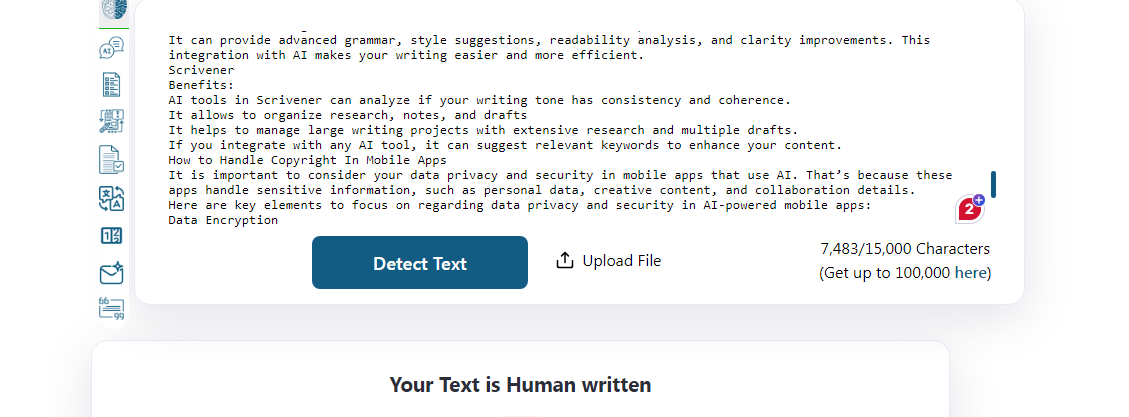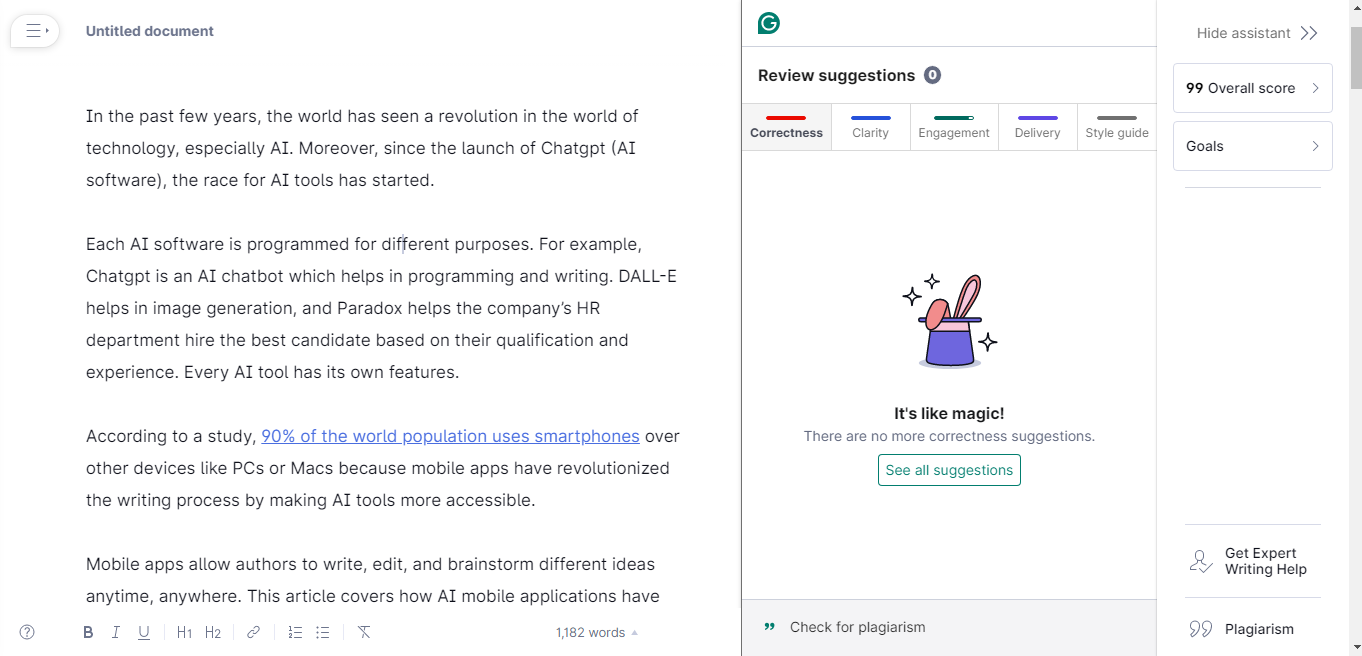In the past few years, the world has seen a revolution in the world of technology, especially AI. Since the launch of Chatgpt (AI software), the race for AI tools has started.
Each AI tool is designed for different purposes.
For example, Chatgpt is an AI chatbot that helps with programming and writing. DALL-E assist in image generation, and Paradox helps the company’s HR department hire the best candidate based on their qualification and experience. Each AI tool has its unique features.
According to a study, 90% of the world's population uses smartphones. That’s because mobile apps have revolutionized the writing process by making AI tools more accessible.
Mobile apps enable authors to write, edit, and brainstorm ideas anytime, anywhere. This article covers how AI mobile applications have made easier the book-writing process.
Understanding AI Apps in Writing
AI writing softwares are not just available on PCs. It can also be accessed on mobile devices. A variety of AI technologies are used in mobile writing apps.
Let's say you are an author or a writer working from home. Many mobile apps for writing can help with various tasks. If you need to check grammar and spelling mistakes in your blog, there’s no need to worry. NLP (Natural Language Processing) technology can help you analyze spelling and detect grammar errors.
Machine Learning can predict the next word or phrase based on the context. This helps writers complete their sentences faster and more accurately. In addition to this, it can analyze your writing patterns to suggest relevant content, phrases, and ideas.
Speech recognition in mobile writing apps can convert spoken words into text. This saves writers time, and they can dictate their ideas and drafts. Similarly, advanced AI algorithms like plagiarism detectors can scan text against various databases to detect plagiarism.
Pre-Writing Phase: Planning and Research:
Now, let’s discuss the first phase of writing, i.e. planning and research. Before writing any book, blog, or article, every writer plans and outlines key points to mention in their book. That’s where AI writing apps help authors. Mobile applications like Chatgpt (mobile version) can help them generate ideas with its latest AI algorithms and capabilities.
Just ask ChatGPT for outlines on a specific keyword, and it will provide a list of relevant outlines. Mobile apps like Google Trends and Keyword Planner can easily analyze the trend of any given keyword directly on your smartphone.
So, if you’re planning to write a book on a topic that isn’t trendy and is searched all over the year, this can help you to write on evergreen topics. Moreover, these mobile AI writing apps can also provide other relevant information like, what’s the most searched topic in your state, in your country, what’s their age group, etc. You can analyze this information at your fingertips.
Writing Phase
Next is the writing phase. Once you’ve gathered all the relevant data based on your researched topic, you can use several mobile applications that can assist you in writing long-form content.
Some writing assistants include Jasper AI, Writersonic, and Rytr. You just have to provide these tools with your researched outlines and keywords. Afterwards, these mobile writing apps will generate long-form content based on your given outlines and keywords.
Additionally, if you need voice-to-text applications, you can find many at the Playstore. Mobile applications like Google Docs, Otter.ai, and text to speech online applications can transcribe your speech into text.
Text-to-speech applications can help writers in many ways. Writers can dictate their thoughts into the document without typing it for hours. This is more useful for capturing ideas quickly or when typing is not possible.
Other than that, AI apps like Otter.ai can transcribe meetings and interviews into editable text. It can help you to add important points to your book without wasting your time typing it.
Collaboration and Feedback
Suppose you’re writing a book which covers different topics, and collaborating with your team. You have expertise on specific topics, while your team members are experts in different niches. In that scenario, you need mobile apps where you can collaborate with your colleagues.
Thanks to AI for helping writers in this aspect, too. Mobile versions of famous softwares like Google Docs, Microsoft OneDrive with Word, and Notion. These apps help you, especially when you’re working with a team. Some of them are the following.
Google Docs
Benefits:
- Multiple users can work on the same document simultaneously, and changes would be visible to everyone.
- Users can leave comments on suggestions on specific paragraphs, which can be accepted or rejected by the author.
- You can keep track of all changes made in the document. This allows the author to revert to previous changes if it’s needed.
- Editors and beta readers can provide instant feedback for revisions.
Microsoft OneDrive and Word
Benefits:
- Multiple users can edit documents simultaneously using Word on OneDrive.
- Authors can see edits and comments from collaborators. This makes it easy to request feedback.
- It combines writing and research tools. This enables to do a comprehensive collaboration.
- It can provide advanced grammar and style suggestions, readability analysis, and clarity improvements. This integration with AI makes your writing easier and more efficient.
Scrivener
Benefits:
- AI tools in Scrivener can analyze if your writing tone has consistency and coherence.
- It enables you to organize research, notes, and drafts
- It helps manage large writing projects with extensive research and multiple drafts.
- If integrated with any AI tool, it can suggest relevant keywords to enhance your content.
How to Handle Copyright In Mobile Apps
It is important to consider data privacy and security in mobile apps that use AI. These apps handle sensitive information, such as personal data, creative content, and collaboration details.
Here are key elements to focus on regarding data privacy and security in AI-powered mobile apps:
It’s crucial to encrypt the data during transmission between the app and the server. This prevents hacking and interception by unauthorized parties.
It is better to require multiple forms of verification, like a password, before granting access to the app, as it enhances its security
It limits access to sensitive data if you assign specific roles with defined permission. This ensures that only authorized users can perform specific actions.
Conclusion
To sum up, these are the ways AI mobile applications have made book writing more convenient. AI-powered mobile apps have made writing more secure, efficient, and better. AI-powered mobile applications can guide and help you from researching relevant topics to publishing online.
If you need help writing a book, check out how to use AI to write a book.
In fact, this is just the beginning. AI companies are continuously developing mobile apps to enhance the writing process for writers, bloggers, and authors.

